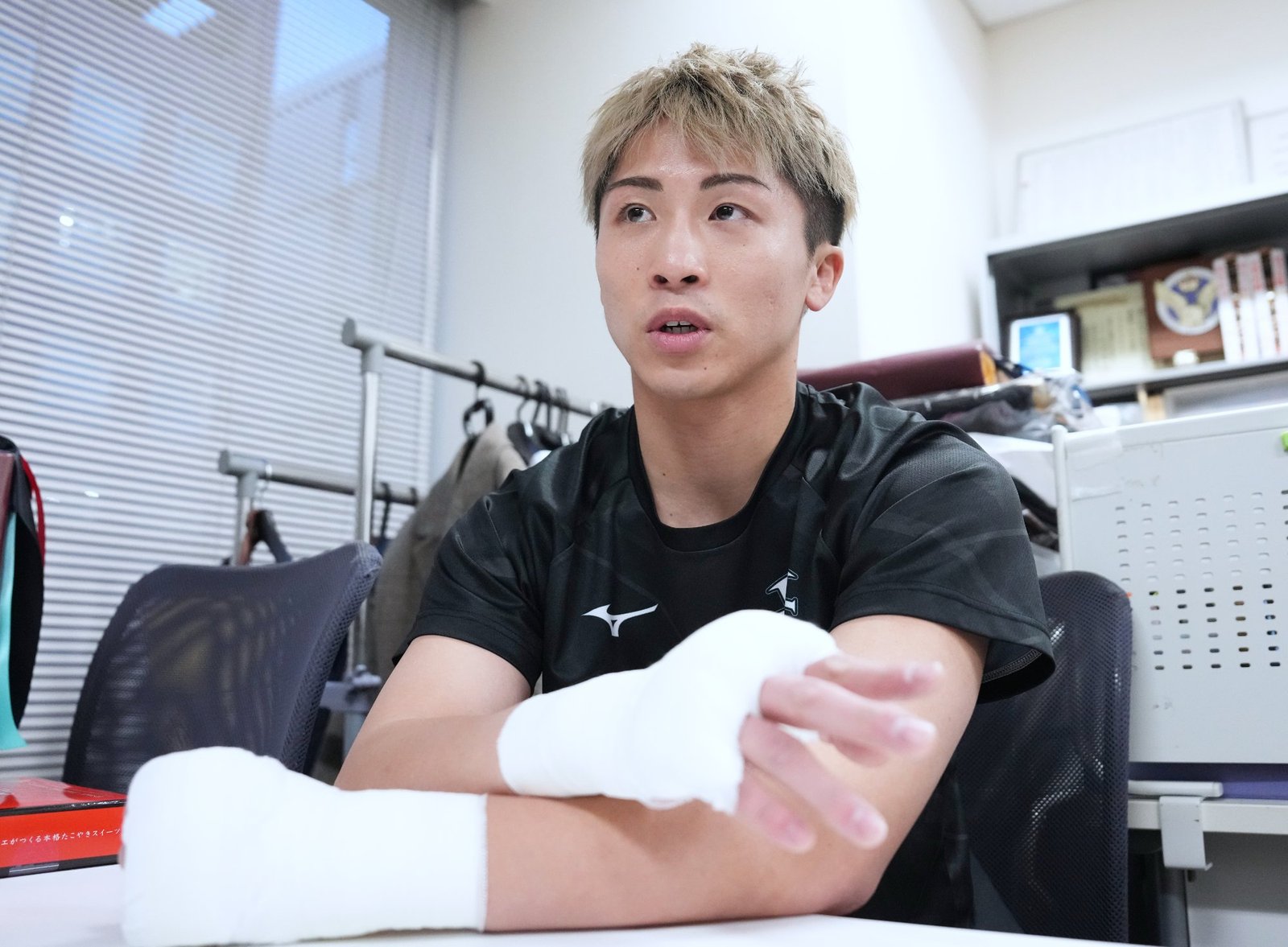[ad_1]
Naoya Inoue says he’s in his prime and plans to fight three times in 2024. He adds that he’s got five more years before retirement. Photo by Naoki Fukuda
Noted sports journalist Daisuke Sugiura, a RingTV.com contributor and a member of the Ring Ratings Panel, recently sat down with Naoya Inoue at the Japanese superstar’s home gym in Yokohama. The undisputed junior featherweight champion candidly shared his thoughts on an eventual move to featherweight, his ceiling in terms of weight climbing, his interest in boxing beyond his own career, and his desire to “crossover” with the American boxing public, among other subjects.

Daisuke Sugiura interviewed Naoya Inoue at the Ohashi Boxing Gym in Yokohama, Japan on January 24. Photo by Naoki Fukuda
I‘m sure you’ve been asked this many times, but how much longer do you plan to fight at super bantamweight?
I’m planning on fighting three times this year. I’m sure these three fights will take place at super bantamweight. My move up to featherweight will depend on how I feel and how my body feels next year.
Are you fighting in May, September and December?
Yes, probably around that time frame.
You previously told me that your weight ceiling is going to be the featherweight division. Is that still the case?
Yes, most likely I will only move up to featherweight.
I feel like your thoughts on your weight division ceiling is not well understood by overseas fans. Some people are still clamoring for a fight with lightweight beltholder Gervonta Davis, but that won’t happen. Your reason for moving up in weight classes is not because you think you can win or make money, but rather to move up to a division where you can perform at your best. Am I correct?
You are correct.

Inoue says his weight climbing will end at featherweight. Performing at his absolute best is more important to him that money and fame. Photo by Naoki Fukuda
And right now, the weight division where you can perform your best is at super bantamweight/junior featherweight, and probably featherweight in the future.
Yes, that’s about it. I always want to show the best Naoya Inoue. I wouldn’t decide to start fighting at featherweight or super featherweight just because the money is good. I don’t think that’s what I want. There are many fighters who have chased the money but ended up not being able to perform well and quit. The reason I box is not for the money; I do this to show my best self. It’s also true that I’m motivated by fighting strong opponents, but there are weight divisions in boxing for a reason.
Is it difficult to make weight even at super bantamweight?
I usually weigh around 64 or 65 kg [141 or 143 pounds between fights], so I have to lose 9 or 10 kg [20 to 22 pounds] before the fight. But it’s not that bad.
When you move up to featherweight, will you have to add muscle to your body?
I don’t need to build my body up to move up to featherweight. I’ll move up once my body naturally grows into the heavier weight class. This has been the case throughout my professional career.
You mentioned Terence Crawford’s name earlier, so have you been paying more attention to your pound-for-pound rival lately?
I try to pay attention to it. However, I don’t really watch heavyweights or the heavier weight classes. I know Oleksandr Usyk is supposed to fight Tyson Fury, but the [heavier] weight classes are so different that I don’t feel like watching or checking it out. It’s just a different kind of boxing than mine. It’s almost a completely different sport.
You’re not the type of person who watches boxing all the time, are you?
No, I am not. I watch when my stablemates from the Ohashi Gym fight, but I’m usually not really interested in the fights overseas that much, to be honest.
Since winning both the Ring Magazine and BWAA Fighter of the Year honors, do you care more about “crossing over” to an extent with the American boxing public?
I’m starting to care about that a lot. Winning an award like the Fighter of the Year should help my status. I don’t live in the United States, so I have no idea how many people are interested in boxing, or how many of them are interested in me, but I’m starting to pay attention to online articles more.

Naoya Inoue has become a mega-star in Japan, but he wants to be embraced by American fans too. Photo by Naoki Fukuda
Your self-awareness has changed a little as your global reputation has increased.
Well, that’s true. Ever since I entered the pound-for-pound rankings, and started to climb to the top, I’ve started paying more attention to it.
Will you and [your Japan-based co-promoter] Mr. [Hideyuki] Ohashi consider future fight dates in the U.S.?
I always have a desire to fight in the U.S. Yes, I definitely want to fight there again. However, Japan is now becoming a big market too. I think the reason behind wanting to capture the “American Dream” is that if you accomplish something in the U.S, name recognition and big money will follow. But, nowadays, in this streaming era, if you are successful in Japan, you can make millions even in the lighter-weight divisions. That’s why [Stephen] Fulton came to Japan, and the big fights are easier to make in Japan.
Right, this is the era of the “Japanese Dream,” especially for smaller fighters.
Yes, everyone wants to fight in Japan. I feel that things are changing in that direction. Originally, everyone wanted to fight in America because there was an opportunity to make big money thanks to a system like PPV. Nowadays, Japan has become the stage that lighter-weight class fighters aspire to compete in.
I think you’re the fighter that started this movement. Recently, you have become the champion that many notable fighters want to fight. Do you feel your opponents are studying you more lately?
Of course, I feel that I’m being studied. In the latest fight against [Marlon] Tapales, I got the impression that Tapales was fighting more defensively. Of course, I think he fought defensively because it was against me, but when champion-class fighters just focus on defense, it’s difficult to make it an exciting fight. If I keep my distance, use my legs and jab, and fight defensively, I can make the fight less exciting too.
So, you didn’t think Tapales was actually trying to win?
I’m curious as to what he was thinking when he chose to fight like that.

Naoya Inoue gradually broke through Marlon Tapales’ cagey shell defense. Photo by Naoki Fukuda
What do you think about the opinion that the effectiveness of your punches has decreased a little after moving up to super bantamweight?
I am still confident that if I hit someone cleanly, I can knock anyone out, at any time. It’s just that the pieces didn’t fit together against Tapales. Even the two knockdowns weren’t as crisp as I wanted, rather, it was a steady attack that caused him to fall down in disgust.
Are you now in the latter half of your career? Or are you nearing the end?
Now I am entering the last five years. I have been thinking of the first five years, the middle five years, and the last five years.
But you don’t feel like you’ve passed your prime yet, do you?
No, not at all.
Do you feel you are in your absolute prime now?
Now I can objectively look at what I want to do in the ring more, and I am able to bring it into the fight. I tend to attack from the beginning, and up until now, thanks to the experience I had accumulated over the decades, my body was able to respond even when I was nervous or my mind was blank. Recently, however, I tend to think first in the ring, stay calm, and then act. My mental game during the fights has been changing.
That’s a positive thing, right?
It’s extremely positive.
Last time we spoke, you said you weren’t sure if you wanted to stay in boxing after retiring from being a professional fighter. How do you feel now?
What do you think? I think I’ll be involved in boxing. Most likely (laugh). I feel like I want to carry on what Mr. Ohashi has created. It is due to the accomplishments of Mr. Ohashi that Ohashi Gym [and promotional company] has become this big. I think it will be extremely difficult to continue this way, and I think it’s up to the people who come after him to bring it down or improve it.
So, do you want to become Mr. Ohashi’s successor?
What I’m doing now as an active fighter is important, of course, but I’d like to continue building on what Mr. Ohashi has created. I believe that’s how I’d like to repay him for raising and guiding me so well.
[ad_2]
Source link



